PREVIOUS
Mahatma Gandhi National Rural Employment Guarantee Act
May 20 , 2019
2482 days
24293
0
- The Mahatma Gandhi National Rural Employment Guarantee Act (MGNREGA), also known as Mahatma Gandhi National Rural Employment Guarantee Scheme (MNREGS) is Indian legislation enacted on August 25, 2005.
- The Word Mahatma Gandhi has been added as a prefix to this Act since 2009.
- It traces back the source as Right to Work under Article 41 of the DPSP (Directive Principle of State Policy) of the Indian Constitution.

- It gives legal guarantee of wage employment to the adult members of rural households who are willing to do unskilled manual labor subject to a maximum of 100 days per household.
- It is a demand-driven programme where the provision of work is triggered by the demand for work by wage-seekers.
- The MGNREGA overcomes problems of targeting through its self-targeting mechanism of beneficiary selection.
- The Ministry of Rural Development (MoRD), Government of India is monitoring the entire implementation of this scheme in association with state governments.
- In its World Development Report 2014, the World Bank termed it a "stellar example of rural development".
Coverage
- The Act was notified in 200 districts in the first phase with effect from February 2nd 2006 and then extended to additional 130 districts in the financial year 2007-2008.
- The remaining districts have been notified under the NREGA with effect from April 1, 2008.
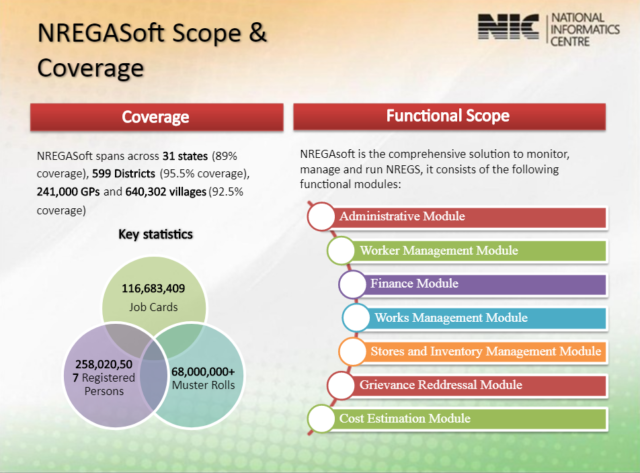
- Thus, NREGA covers the entire country with the exception of districts that have a hundred percent urban population.
- In other words, now it is applicable for all villages in the Districts across the country.
- Every rural household has the right to register under MGNREGA.
Working mechanism
- Job cards are issued to every household registered under MGNREGA within 15 days from the date of receipt of application.
- The Gram Panchayat after due verification will issue a Job Card.
- The Job Card will bear the photograph of all adult members of the household willing to work under MGNREGA and is free of cost.

- At least 50% of works will be allotted to Gram Panchayats for execution.
- The village community has the right to choose works under 8 permissible categories of works.
- The works proposed by the village community cannot be altered by anyone unless they are not in conformity with the guidelines of MGNREGA.
- The work shall be provided within 5 kms jurisdiction from the village.
- If the work provided is beyond 5 Kms, the job seekers shall be given 10% of the minimum wages as additional amount.
- Wages are paid according to State Minimum Wage rate notified under Minimum Wages Act 1948.
- Employment will be given within 15 days of application for work.
- If it is not then daily unemployment allowance has to be paid.
- The liability of payment of unemployment allowance is of the States.
Funding
- State Government has to pay 25% of minimum wage for the 1st 30 days as compensatory daily unemployment allowance on failure to provide employment for the families demanding the works under MGNREG Act, and ½ of wage for remaining period of the year, if there was need.
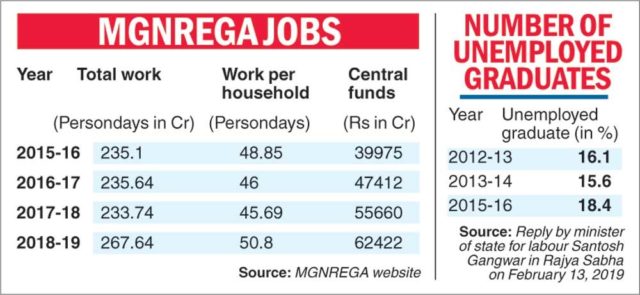
- The Central Government bears the 100 percent wage cost of unskilled manual labor and 75 percent of the material cost including the wages of skilled and semi-skilled workers.
Permissible Works
- Main Water Conservation.
- Drought Prevention (including Farmville farm and forestations).
- Horrible Flood Protection.
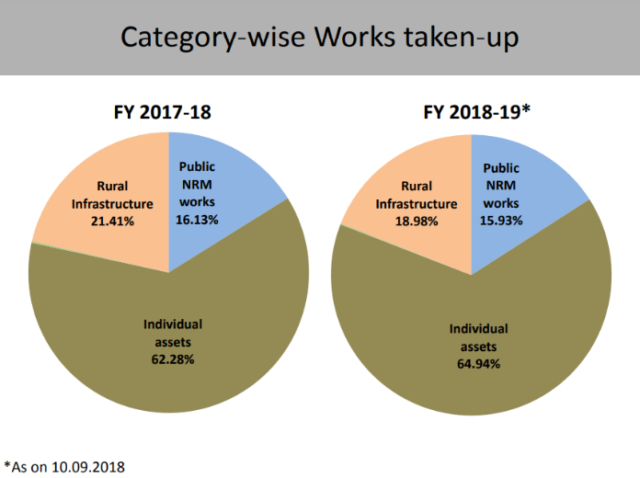
- Land Development.
- Minor Watering, farming and area growth on the area of SC/ST/ -BPL/IAY and land change beneficiaries.
- Rural connectivity.
Salient features
- Equal payment for men and women.
- Wage has to be done weekly basis and not beyond a fortnight.
- 1/3 beneficiaries should be women.
- Work site facilities such as creche, drinking water and shade, emergency health care have to be provided.
- 60:40 wage and material ratio have to be maintained for all works undertaken under NREGA.
- No contractors and machinery are allowed.
- Grievance redressal mechanism to be set up for ensuring a responsive implementation process.
- Social Audit, to be done by Gram Sabha, is a must for all the works implemented under NREGA.
- Provisions of RTI Act shall be applicable in Letter & Spirit to ensure transparency and accountability.
- Seeks to protect the environment through rural works which is consistent with Article 48A that directs the State to protect the environment.
Pros and Cons
- The multifarious benefits include "reduction in poverty, reduction in migration, women empowerment, improvement of productivity of agricultural land and regeneration of water resources" etc.
- Critics of this Act includes expansion of fiscal deficit of Indian Government, Unnecessary inflation in rural areas, unprotective assets, unavailability of manual labor for farm sector etc.
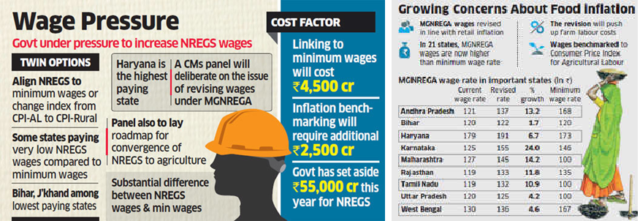
Recent developments
- All the wages must be disbursed through the mechanism of Direct Benefit Transfer.
- The facility of Geo Tagging has been introduced in June 2016.
- A Memorandum of Understanding (MoU) was signed between Ministry of Rural Development (MoRD) and the National Remote Sensing Centre (NRSC), ISRO, Hyderabad, for geo-tagging of the assets created under MGNREGA.
- Geo-tagging exercise is a national level initiative involving linking ISRO-Bhuvan with "NREGA-Soft" interface operated under DoRD by National Informatics Centre (NIC).
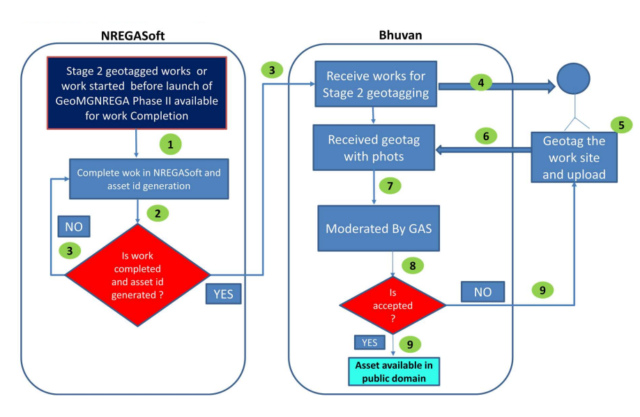
- In 2012, the then Prime Minister Manmohan Singh released the book called MGNREGA Sameeksha which was anthology of research studies about this Act.
- MGNREGA Sameeksha II was launched on 2015 reviews research studies carried out and published over the last two years (2012–14) to foster reflection and understanding about MGNREGA and its impact.
Keywords of this Act
- Right based framework
- Time Bound Guarantee
- Labor intensive works
- Decentralized Planning
- Women empowerment
- Transparency and Accountability
- Poverty reduction
- Prevention of Migration
- Upliftment of weaker sections – such as SC/ST and landless laborer.
- - - - - - - - - - - - - - -
Leave a Reply
Your Comment is awaiting moderation.


